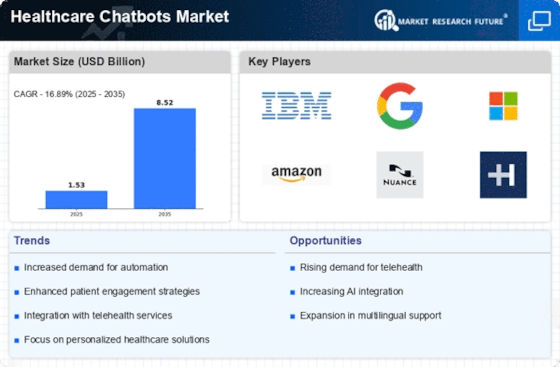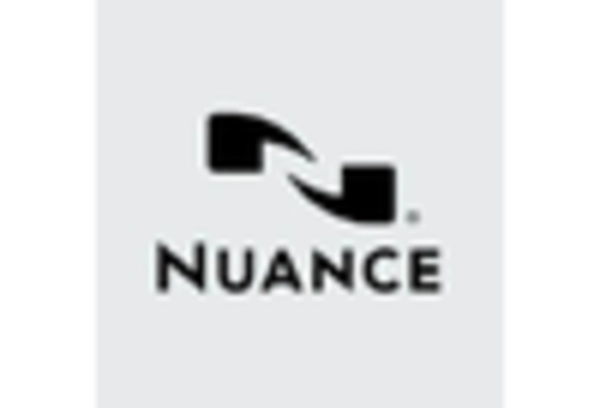Symptom Checking
Appointment Scheduling
Medication Assistance
Patient Education
Artificial Intelligence
Natural Language Processing
Machine Learning
Decision Tree Algorithms
Hospitals
Clinics
Pharmaceutical Companies
Insurance Providers
On-Premise
Cloud-Based
North America
Europe
South America
Asia Pacific
Middle East and Africa
North America Outlook (USD Billion, 2019-2035)
North America Healthcare Chatbots Market by Application Type
Symptom Checking
Appointment Scheduling
Medication Assistance
Patient Education
North America Healthcare Chatbots Market by Technology Type
Artificial Intelligence
Natural Language Processing
Machine Learning
Decision Tree Algorithms
North America Healthcare Chatbots Market by End User Type
Hospitals
Clinics
Pharmaceutical Companies
Insurance Providers
North America Healthcare Chatbots Market by Deployment Type
On-Premise
Cloud-Based
North America Healthcare Chatbots Market by Regional Type
US
Canada
US Outlook (USD Billion, 2019-2035)
US Healthcare Chatbots Market by Application Type
Symptom Checking
Appointment Scheduling
Medication Assistance
Patient Education
US Healthcare Chatbots Market by Technology Type
Artificial Intelligence
Natural Language Processing
Machine Learning
Decision Tree Algorithms
US Healthcare Chatbots Market by End User Type
Hospitals
Clinics
Pharmaceutical Companies
Insurance Providers
US Healthcare Chatbots Market by Deployment Type
On-Premise
Cloud-Based
CANADA Outlook (USD Billion, 2019-2035)
CANADA Healthcare Chatbots Market by Application Type
Symptom Checking
Appointment Scheduling
Medication Assistance
Patient Education
CANADA Healthcare Chatbots Market by Technology Type
Artificial Intelligence
Natural Language Processing
Machine Learning
Decision Tree Algorithms
CANADA Healthcare Chatbots Market by End User Type
Hospitals
Clinics
Pharmaceutical Companies
Insurance Providers
CANADA Healthcare Chatbots Market by Deployment Type
On-Premise
Cloud-Based
Europe Outlook (USD Billion, 2019-2035)
Europe Healthcare Chatbots Market by Application Type
Symptom Checking
Appointment Scheduling
Medication Assistance
Patient Education
Europe Healthcare Chatbots Market by Technology Type
Artificial Intelligence
Natural Language Processing
Machine Learning
Decision Tree Algorithms
Europe Healthcare Chatbots Market by End User Type
Hospitals
Clinics
Pharmaceutical Companies
Insurance Providers
Europe Healthcare Chatbots Market by Deployment Type
On-Premise
Cloud-Based
Europe Healthcare Chatbots Market by Regional Type
Germany
UK
France
Russia
Italy
Spain
Rest of Europe
GERMANY Outlook (USD Billion, 2019-2035)
GERMANY Healthcare Chatbots Market by Application Type
Symptom Checking
Appointment Scheduling
Medication Assistance
Patient Education
GERMANY Healthcare Chatbots Market by Technology Type
Artificial Intelligence
Natural Language Processing
Machine Learning
Decision Tree Algorithms
GERMANY Healthcare Chatbots Market by End User Type
Hospitals
Clinics
Pharmaceutical Companies
Insurance Providers
GERMANY Healthcare Chatbots Market by Deployment Type
On-Premise
Cloud-Based
UK Outlook (USD Billion, 2019-2035)
UK Healthcare Chatbots Market by Application Type
Symptom Checking
Appointment Scheduling
Medication Assistance
Patient Education
UK Healthcare Chatbots Market by Technology Type
Artificial Intelligence
Natural Language Processing
Machine Learning
Decision Tree Algorithms
UK Healthcare Chatbots Market by End User Type
Hospitals
Clinics
Pharmaceutical Companies
Insurance Providers
UK Healthcare Chatbots Market by Deployment Type
On-Premise
Cloud-Based
FRANCE Outlook (USD Billion, 2019-2035)
FRANCE Healthcare Chatbots Market by Application Type
Symptom Checking
Appointment Scheduling
Medication Assistance
Patient Education
FRANCE Healthcare Chatbots Market by Technology Type
Artificial Intelligence
Natural Language Processing
Machine Learning
Decision Tree Algorithms
FRANCE Healthcare Chatbots Market by End User Type
Hospitals
Clinics
Pharmaceutical Companies
Insurance Providers
FRANCE Healthcare Chatbots Market by Deployment Type
On-Premise
Cloud-Based
RUSSIA Outlook (USD Billion, 2019-2035)
RUSSIA Healthcare Chatbots Market by Application Type
Symptom Checking
Appointment Scheduling
Medication Assistance
Patient Education
RUSSIA Healthcare Chatbots Market by Technology Type
Artificial Intelligence
Natural Language Processing
Machine Learning
Decision Tree Algorithms
RUSSIA Healthcare Chatbots Market by End User Type
Hospitals
Clinics
Pharmaceutical Companies
Insurance Providers
RUSSIA Healthcare Chatbots Market by Deployment Type
On-Premise
Cloud-Based
ITALY Outlook (USD Billion, 2019-2035)
ITALY Healthcare Chatbots Market by Application Type
Symptom Checking
Appointment Scheduling
Medication Assistance
Patient Education
ITALY Healthcare Chatbots Market by Technology Type
Artificial Intelligence
Natural Language Processing
Machine Learning
Decision Tree Algorithms
ITALY Healthcare Chatbots Market by End User Type
Hospitals
Clinics
Pharmaceutical Companies
Insurance Providers
ITALY Healthcare Chatbots Market by Deployment Type
On-Premise
Cloud-Based
SPAIN Outlook (USD Billion, 2019-2035)
SPAIN Healthcare Chatbots Market by Application Type
Symptom Checking
Appointment Scheduling
Medication Assistance
Patient Education
SPAIN Healthcare Chatbots Market by Technology Type
Artificial Intelligence
Natural Language Processing
Machine Learning
Decision Tree Algorithms
SPAIN Healthcare Chatbots Market by End User Type
Hospitals
Clinics
Pharmaceutical Companies
Insurance Providers
SPAIN Healthcare Chatbots Market by Deployment Type
On-Premise
Cloud-Based
REST OF EUROPE Outlook (USD Billion, 2019-2035)
REST OF EUROPE Healthcare Chatbots Market by Application Type
Symptom Checking
Appointment Scheduling
Medication Assistance
Patient Education
REST OF EUROPE Healthcare Chatbots Market by Technology Type
Artificial Intelligence
Natural Language Processing
Machine Learning
Decision Tree Algorithms
REST OF EUROPE Healthcare Chatbots Market by End User Type
Hospitals
Clinics
Pharmaceutical Companies
Insurance Providers
REST OF EUROPE Healthcare Chatbots Market by Deployment Type
On-Premise
Cloud-Based
APAC Outlook (USD Billion, 2019-2035)
APAC Healthcare Chatbots Market by Application Type
Symptom Checking
Appointment Scheduling
Medication Assistance
Patient Education
APAC Healthcare Chatbots Market by Technology Type
Artificial Intelligence
Natural Language Processing
Machine Learning
Decision Tree Algorithms
APAC Healthcare Chatbots Market by End User Type
Hospitals
Clinics
Pharmaceutical Companies
Insurance Providers
APAC Healthcare Chatbots Market by Deployment Type
On-Premise
Cloud-Based
APAC Healthcare Chatbots Market by Regional Type
China
India
Japan
South Korea
Malaysia
Thailand
Indonesia
Rest of APAC
CHINA Outlook (USD Billion, 2019-2035)
CHINA Healthcare Chatbots Market by Application Type
Symptom Checking
Appointment Scheduling
Medication Assistance
Patient Education
CHINA Healthcare Chatbots Market by Technology Type
Artificial Intelligence
Natural Language Processing
Machine Learning
Decision Tree Algorithms
CHINA Healthcare Chatbots Market by End User Type
Hospitals
Clinics
Pharmaceutical Companies
Insurance Providers
CHINA Healthcare Chatbots Market by Deployment Type
On-Premise
Cloud-Based
INDIA Outlook (USD Billion, 2019-2035)
INDIA Healthcare Chatbots Market by Application Type
Symptom Checking
Appointment Scheduling
Medication Assistance
Patient Education
INDIA Healthcare Chatbots Market by Technology Type
Artificial Intelligence
Natural Language Processing
Machine Learning
Decision Tree Algorithms
INDIA Healthcare Chatbots Market by End User Type
Hospitals
Clinics
Pharmaceutical Companies
Insurance Providers
INDIA Healthcare Chatbots Market by Deployment Type
On-Premise
Cloud-Based
JAPAN Outlook (USD Billion, 2019-2035)
JAPAN Healthcare Chatbots Market by Application Type
Symptom Checking
Appointment Scheduling
Medication Assistance
Patient Education
JAPAN Healthcare Chatbots Market by Technology Type
Artificial Intelligence
Natural Language Processing
Machine Learning
Decision Tree Algorithms
JAPAN Healthcare Chatbots Market by End User Type
Hospitals
Clinics
Pharmaceutical Companies
Insurance Providers
JAPAN Healthcare Chatbots Market by Deployment Type
On-Premise
Cloud-Based
SOUTH KOREA Outlook (USD Billion, 2019-2035)
SOUTH KOREA Healthcare Chatbots Market by Application Type
Symptom Checking
Appointment Scheduling
Medication Assistance
Patient Education
SOUTH KOREA Healthcare Chatbots Market by Technology Type
Artificial Intelligence
Natural Language Processing
Machine Learning
Decision Tree Algorithms
SOUTH KOREA Healthcare Chatbots Market by End User Type
Hospitals
Clinics
Pharmaceutical Companies
Insurance Providers
SOUTH KOREA Healthcare Chatbots Market by Deployment Type
On-Premise
Cloud-Based
MALAYSIA Outlook (USD Billion, 2019-2035)
MALAYSIA Healthcare Chatbots Market by Application Type
Symptom Checking
Appointment Scheduling
Medication Assistance
Patient Education
MALAYSIA Healthcare Chatbots Market by Technology Type
Artificial Intelligence
Natural Language Processing
Machine Learning
Decision Tree Algorithms
MALAYSIA Healthcare Chatbots Market by End User Type
Hospitals
Clinics
Pharmaceutical Companies
Insurance Providers
MALAYSIA Healthcare Chatbots Market by Deployment Type
On-Premise
Cloud-Based
THAILAND Outlook (USD Billion, 2019-2035)
THAILAND Healthcare Chatbots Market by Application Type
Symptom Checking
Appointment Scheduling
Medication Assistance
Patient Education
THAILAND Healthcare Chatbots Market by Technology Type
Artificial Intelligence
Natural Language Processing
Machine Learning
Decision Tree Algorithms
THAILAND Healthcare Chatbots Market by End User Type
Hospitals
Clinics
Pharmaceutical Companies
Insurance Providers
THAILAND Healthcare Chatbots Market by Deployment Type
On-Premise
Cloud-Based
INDONESIA Outlook (USD Billion, 2019-2035)
INDONESIA Healthcare Chatbots Market by Application Type
Symptom Checking
Appointment Scheduling
Medication Assistance
Patient Education
INDONESIA Healthcare Chatbots Market by Technology Type
Artificial Intelligence
Natural Language Processing
Machine Learning
Decision Tree Algorithms
INDONESIA Healthcare Chatbots Market by End User Type
Hospitals
Clinics
Pharmaceutical Companies
Insurance Providers
INDONESIA Healthcare Chatbots Market by Deployment Type
On-Premise
Cloud-Based
REST OF APAC Outlook (USD Billion, 2019-2035)
REST OF APAC Healthcare Chatbots Market by Application Type
Symptom Checking
Appointment Scheduling
Medication Assistance
Patient Education
REST OF APAC Healthcare Chatbots Market by Technology Type
Artificial Intelligence
Natural Language Processing
Machine Learning
Decision Tree Algorithms
REST OF APAC Healthcare Chatbots Market by End User Type
Hospitals
Clinics
Pharmaceutical Companies
Insurance Providers
REST OF APAC Healthcare Chatbots Market by Deployment Type
On-Premise
Cloud-Based
South America Outlook (USD Billion, 2019-2035)
South America Healthcare Chatbots Market by Application Type
Symptom Checking
Appointment Scheduling
Medication Assistance
Patient Education
South America Healthcare Chatbots Market by Technology Type
Artificial Intelligence
Natural Language Processing
Machine Learning
Decision Tree Algorithms
South America Healthcare Chatbots Market by End User Type
Hospitals
Clinics
Pharmaceutical Companies
Insurance Providers
South America Healthcare Chatbots Market by Deployment Type
On-Premise
Cloud-Based
South America Healthcare Chatbots Market by Regional Type
Brazil
Mexico
Argentina
Rest of South America
BRAZIL Outlook (USD Billion, 2019-2035)
BRAZIL Healthcare Chatbots Market by Application Type
Symptom Checking
Appointment Scheduling
Medication Assistance
Patient Education
BRAZIL Healthcare Chatbots Market by Technology Type
Artificial Intelligence
Natural Language Processing
Machine Learning
Decision Tree Algorithms
BRAZIL Healthcare Chatbots Market by End User Type
Hospitals
Clinics
Pharmaceutical Companies
Insurance Providers
BRAZIL Healthcare Chatbots Market by Deployment Type
On-Premise
Cloud-Based
MEXICO Outlook (USD Billion, 2019-2035)
MEXICO Healthcare Chatbots Market by Application Type
Symptom Checking
Appointment Scheduling
Medication Assistance
Patient Education
MEXICO Healthcare Chatbots Market by Technology Type
Artificial Intelligence
Natural Language Processing
Machine Learning
Decision Tree Algorithms
MEXICO Healthcare Chatbots Market by End User Type
Hospitals
Clinics
Pharmaceutical Companies
Insurance Providers
MEXICO Healthcare Chatbots Market by Deployment Type
On-Premise
Cloud-Based
ARGENTINA Outlook (USD Billion, 2019-2035)
ARGENTINA Healthcare Chatbots Market by Application Type
Symptom Checking
Appointment Scheduling
Medication Assistance
Patient Education
ARGENTINA Healthcare Chatbots Market by Technology Type
Artificial Intelligence
Natural Language Processing
Machine Learning
Decision Tree Algorithms
ARGENTINA Healthcare Chatbots Market by End User Type
Hospitals
Clinics
Pharmaceutical Companies
Insurance Providers
ARGENTINA Healthcare Chatbots Market by Deployment Type
On-Premise
Cloud-Based
REST OF SOUTH AMERICA Outlook (USD Billion, 2019-2035)
REST OF SOUTH AMERICA Healthcare Chatbots Market by Application Type
Symptom Checking
Appointment Scheduling
Medication Assistance
Patient Education
REST OF SOUTH AMERICA Healthcare Chatbots Market by Technology Type
Artificial Intelligence
Natural Language Processing
Machine Learning
Decision Tree Algorithms
REST OF SOUTH AMERICA Healthcare Chatbots Market by End User Type
Hospitals
Clinics
Pharmaceutical Companies
Insurance Providers
REST OF SOUTH AMERICA Healthcare Chatbots Market by Deployment Type
On-Premise
Cloud-Based
MEA Outlook (USD Billion, 2019-2035)
MEA Healthcare Chatbots Market by Application Type
Symptom Checking
Appointment Scheduling
Medication Assistance
Patient Education
MEA Healthcare Chatbots Market by Technology Type
Artificial Intelligence
Natural Language Processing
Machine Learning
Decision Tree Algorithms
MEA Healthcare Chatbots Market by End User Type
Hospitals
Clinics
Pharmaceutical Companies
Insurance Providers
MEA Healthcare Chatbots Market by Deployment Type
On-Premise
Cloud-Based
MEA Healthcare Chatbots Market by Regional Type
GCC Countries
South Africa
Rest of MEA
GCC COUNTRIES Outlook (USD Billion, 2019-2035)
GCC COUNTRIES Healthcare Chatbots Market by Application Type
Symptom Checking
Appointment Scheduling
Medication Assistance
Patient Education
GCC COUNTRIES Healthcare Chatbots Market by Technology Type
Artificial Intelligence
Natural Language Processing
Machine Learning
Decision Tree Algorithms
GCC COUNTRIES Healthcare Chatbots Market by End User Type
Hospitals
Clinics
Pharmaceutical Companies
Insurance Providers
GCC COUNTRIES Healthcare Chatbots Market by Deployment Type
On-Premise
Cloud-Based
SOUTH AFRICA Outlook (USD Billion, 2019-2035)
SOUTH AFRICA Healthcare Chatbots Market by Application Type
Symptom Checking
Appointment Scheduling
Medication Assistance
Patient Education
SOUTH AFRICA Healthcare Chatbots Market by Technology Type
Artificial Intelligence
Natural Language Processing
Machine Learning
Decision Tree Algorithms
SOUTH AFRICA Healthcare Chatbots Market by End User Type
Hospitals
Clinics
Pharmaceutical Companies
Insurance Providers
SOUTH AFRICA Healthcare Chatbots Market by Deployment Type
On-Premise
Cloud-Based
REST OF MEA Outlook (USD Billion, 2019-2035)
REST OF MEA Healthcare Chatbots Market by Application Type
Symptom Checking
Appointment Scheduling
Medication Assistance
Patient Education
REST OF MEA Healthcare Chatbots Market by Technology Type
Artificial Intelligence
Natural Language Processing
Machine Learning
Decision Tree Algorithms
REST OF MEA Healthcare Chatbots Market by End User Type
Hospitals
Clinics
Pharmaceutical Companies
Insurance Providers
REST OF MEA Healthcare Chatbots Market by Deployment Type
On-Premise
Cloud-Based


















Leave a Comment